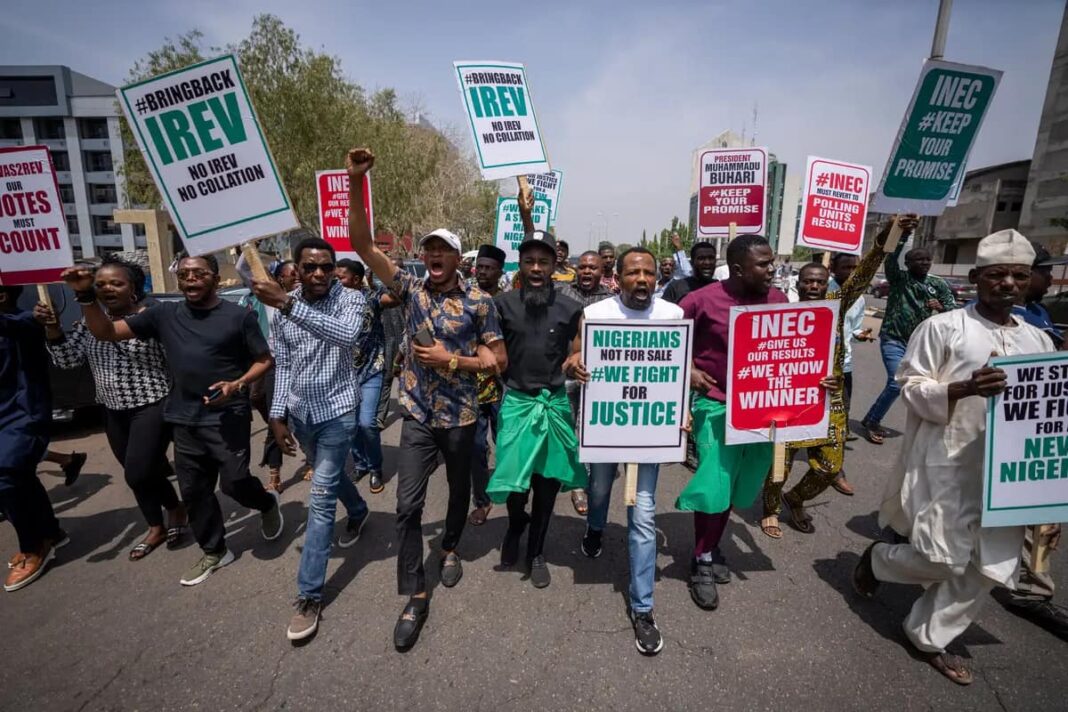Since February 25, 2023, the day that the Presidential Election was conducted, most Nigerians have been in shock following the incompetent handling and mismanagement of the electoral process by the Independent National Electoral Commission (INEC).
In the process of trying to provide an explanation for its ineptitude, INEC issued a press release through one of its national commissioners, Barrister Festus Okoye, which claimed that its failure to transmit results from the polling booths across the country arose from the failure (or is it inability?) of its information technology infrastructure to handle the demands of national elections as well as it did when state elections were conducted in the recent past.
It’s so sad that an eminent and consequential national institution like INEC could embark on such a voyage of insults to the sensibilities of Nigerians by the claim made in the said release concerning the capacity and reliability of the servers it deployed during the elections.
In the said press release, INEC admitted that its network was “relatively slow and unsteady” and ascribed the challenge to “technical hitches related to scaling up the iRev from a platform for managing off-season, state elections, to one for managing nationwide general elections”. In summary, INEC was admitting that the size/capacity of its servers were inadequate or inappropriate in handling the load arising from the voting exercise.
Servers are generally deployed to store and retrieve information, amongst other associated ends, and anyone with a basic or elementary knowledge of this subject matter/area would confirm that load testing is a fundamental and indispensable procedure usually carried out to simulate the performance of the server at different capacity levels to confirm its reliability in handling data storage and retrieval at different thresholds.
For instance, in the Banking and Telecommunications industry, the load testing process would involve simulating with billions of entries and calls in uploads and retrievals to and from the server. It is certainly inconceivable that INEC would embark on a major election project without properly assessing its requirements based on raw data available from previous elections and the current population of voters.
In this regard, what INEC is saying is that its installed server capacity was incapable of handling less than 180,000 uploads from the polling units across the country! This is less than one percent of what an average Nigerian bank handles a day in dealing with transactions from multiple channels and far less for a telco dealing with millions of customers on a minute-by-minute basis.
Even at that, the advances made in cloud computing also avails INEC tremendous opportunities to store and retrieve data and this could well support a contingency plan in a project of this nature. This option has almost limitless bandwidth capacity to assist INEC achieve intended objectives at very minimal costs.
If the arrangement put in place by INEC could support the instant retrieval of picture information for millions of voters across the country during the voter accreditation process, what could be the challenge in transmitting less than 180,000 result sheets from polling units across Nigeria?
In other words, if the INEC server had sufficient bandwidth to support the retrieval of picture information for millions of voters simultaneously at various polling booths, then the claim that it was impossible to transmit results from less than 180,000 locations is utter balderdash.
Or did the company from whom it secured the bandwidth suddenly withdraw its support, without notice, at such a crucial time?
With the claim by INEC, it is important to interrogate the credentials of its IT personnel as well as the quality of the advisory support it procured in the course of executing its technology infrastructure plan for the election. As a matter of fact, the Computer Association of Nigeria should be interested in this national show of infamy which appears to have been orchestrated by its members working in the IT department of INEC.
A nation cannot spend over N300 billion in a national elections exercise and the desired outcomes are being threatened by the failure of technology as claimed by INEC. Nigerians, including professional associations like the Computer Association of Nigeria, must hold their members in INEC to account.
It is sad that INEC is embarking on this voyage of deceit and falsehood against the interest of Nigerians with outright impunity. Its conduct and handling of the February 25, 2023 Presidential and National Assembly polls is capable of undermining our existence as a nation. As a national institution, INEC must recognise its pre-eminent position as a consequential organisation whose performance (or lack thereof) has fundamental implications for our national cohesion, progress and development.
It is, indeed, a double jeopardy for a public institution that has received substantial resources from the national treasury and the overwhelming support of Nigerians to bungle an election management process and insult the sensibility of Nigerians with barefaced cocktail of lies and obvious falsehood as INEC would appear to have done with its press release.
As Nigerians reflect on this national debacle and disgrace, we cannot stop counting the cost of INEC’s ineptitude to the national treasury and our collective psyche. It would reinforce the citizens’ lack of trust in our national institutions and their appalling inability to work for the benefit and service of our citizens.
And yet again, we have betrayed the teeming population of our youths who, for once, were convinced by INEC to participate in the electoral process with promises of running a credible and transparent process whose outcome would reflect the wishes of the voters.
With their feeling of despondency at an all-time high, we must take urgent steps to begin the process of restoring their trust in their fatherland by doing what is right and proper.
I am concerned, and I believe a lot of Nigerians share this sentiment, that failing them at this time could have dire consequences for us as a nation. Enough said! A stitch in time saves nine. And may God save Nigeria from INEC’s show of shame and descent to infamy.
Nick Opara-Ndudu is a Chartered Accountant and former bank executive.
By Nick Opara-Ndudu



